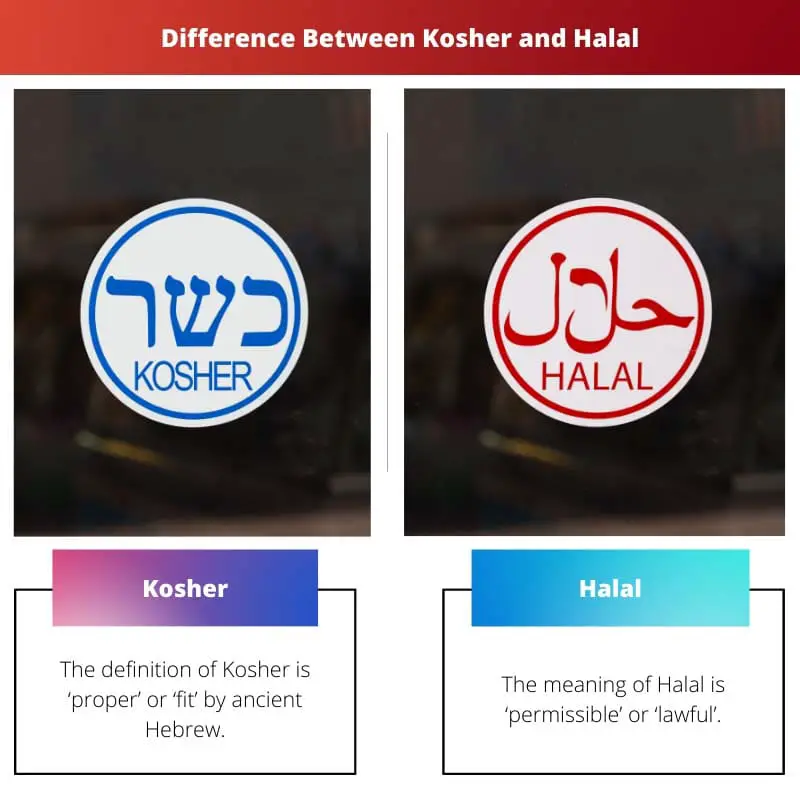Although people are familiar, to an extent, with the religious reasons behind these terms, there continues to be constant confusion regarding the overall meaning of Kosher and Halal.
Key Takeaways
- Kosher refers to Jewish dietary laws, while Halal pertains to Islamic dietary guidelines.
- Kosher meat requires the animal to be slaughtered by a specially trained individual, while Halal meat mandates reciting a prayer during slaughter.
- Kosher and Halal diets prohibit pork consumption and have strict guidelines for food preparation and handling.
Kosher vs Halal
Kosher is a law in the Judaism religion that explains the rules concerning diet and meat consumption. It states the kind of food that Jews can eat and the procedure of prayer before slaughtering livestock. Halal is the law of slaughtering and consuming meat based on Islamic dietary laws.

The term Kosher is frequently heard in the European region. It is part of the Kashrut, a set of religious laws about diet and meat consumption, followed by the Jewish population.
Halal is one of the most popular terms around the globe related to meat consumption. The widespread popularity of the term Halal attributes it to the large global population following the Islamic religion.
Comparison Table
| Parameters of Comparison | Kosher | Halal |
|---|---|---|
| Religion | Kosher is a part of the Kashrut law from Judaism. | Halal is as per the principles of Islam. |
| Definition | The definition of Kosher is ‘proper’ or ‘fit’ by ancient Hebrew | The meaning of Halal is ‘permissible’ or ‘lawful’. |
| Alcohol | It allows the intake of alcohol, prepared according to Kosher law. | It strictly prohibits the intake of Alcohol by Islamic law. |
| Seafood | Allows seafood of animals that possesses scales and fins. | It allows the consumption of seafood prepared by halal. |
| Combination | Kosher strictly prohibits the combination of dairy and meat. | Halal allows the mixture of dairy and milk. |
What is Kosher?
Kosher is a famous term among the Jewish population and in the European region. The term Kosher denotes the law followed in the Judaism religion regarding diet and meat consumption.
The definition of the term Kosher is ‘proper’, and these laws are preached by the ancient Jewish text Torah. Some important allowed and disallowed food according to the Kosher law is explained below.
- The creatures from freshwater and saltwater that possess both scales and fins are allowed to be consumed by the law.
- Except for pork, all meat from animals on land is allowed. But only if the land animal possesses cloven hooves and if it chews the cud.
Kosher law also asks to follow a procedure of prayer before the slaughter of livestock. The process of slaughtering must be quick and painless, according to the terms dictated by Kosher law.

What is Halal?
It is impossible to skip the term Halal-cooked and Halal-processed in a restaurant or a meat shop. The word Halal can be defined as lawful.
Halal is also a method of slaughtering and consuming meat according to Islamic dietary laws. Some significant aspects of Halal processing are mentioned below.
- The slaughterer of the livestock must be a follower of the Islamic religion.
- It requires mandatory prayer before slaughtering the animals.
- The knife needs to be sharp, as it would make the process quick and minimize the pain.
Islam allows all seafood and land animals to be consumed, except for pork which is strictly forbidden according to Quran. Additives from any of the banned food or alcohol are not considered halal by Islam.

Main Differences Between Kosher and Halal
- Kosher meat is allowed for preparation and consumption by halal, but halal meat is not allowed for the Kosher process.
- Only sea creatures with scales and fins are allowed to be consumed by Kosher law. All sea creatures can be consumed according to Halal law.

This article presents a compelling scholarly inquiry into the cultural and religious aspects of Kosher and Halal dietary laws. The informative nature of the content serves as a valuable resource for academic exploration and cross-cultural dialogue.
I completely agree. The scholarly inquiry fosters intellectual curiosity and encourages readers to engage critically with the religious and cultural dimensions of Kosher and Halal dietary laws.
The clear and concise comparison table provided in the article significantly aids in understanding the unique characteristics of Kosher and Halal diets. This table is an excellent visual aid for readers.
I completely agree. The table effectively summarizes the key differences and facilitates quick reference to essential information.
The comparative analysis of Kosher and Halal laws is highly insightful. This article contributes significantly to clarifying misconceptions and misunderstandings surrounding these dietary practices.
The in-depth examination of the religious roots of Kosher and Halal diets helps in fostering a greater appreciation of cultural and religious diversity. It promotes intercultural understanding and respect.
I agree. By addressing the differences in religious foundations and specific food regulations, this article presents a thorough and well-rounded perspective on each dietary law.
The detailed explanations of both Kosher and Halal dietary laws demonstrate the meticulous research conducted for this article. It’s a valuable source of information for readers interested in religious dietary practices.
I appreciate the depth of insight presented in this article. It provides a well-rounded understanding of the religious and cultural underpinnings of both Kosher and Halal diets.
The linguistic and terminological distinctions between Kosher and Halal, as presented in this article, are crucial in preventing linguistic misunderstandings and misinterpretations. Language precision is key in the discussion of religious dietary laws.
This article effectively dispels linguistic ambiguities and highlights the distinctive meanings embedded in the terms ‘Kosher’ and ‘Halal’. It’s a commendable effort in promoting linguistic precision and clarity.
Absolutely. The precise definitions and explanations of the terms ‘Kosher’ and ‘Halal’ contribute immensely to the accuracy of the content and its value to readers.
The article’s attention to linguistic and cultural precision is commendable. By elucidating the terminology and religious principles underpinning Kosher and Halal dietary laws, it promotes linguistic accuracy and cultural understanding.
The article’s meticulous attention to linguistic and cultural nuances serves as a commendable example of promoting clarity and precision in discussing religious dietary practices.
Absolutely. The focus on linguistic and cultural accuracy adds depth to the discussion of religious dietary laws and contributes to greater cross-cultural understanding.
The detailed explanation of the procedures and rituals involved in both Kosher and Halal dietary laws demonstrates the depth of knowledge presented in this article. It’s truly enlightening.
Absolutely. The article effectively communicates the fundamental principles of both dietary guidelines, leaving no room for ambiguity or uncertainty.
I appreciate the clarity of language and the informative nature of the content. It encourages readers to engage with the topic at a more profound level.
The inclusion of meaningful references and citations enhances the scholarly nature of this article. It reflects the commitment to academic rigor and intellectual depth in discussing religious dietary laws.
The robust references utilized in this article serve as valuable resources for individuals seeking to explore the religious and cultural factors that shape Kosher and Halal dietary laws.
I completely agree. The references provide readers with the opportunity to explore further and delve deeper into the religious principles and historical context of Kosher and Halal diets.
The article’s clarity and intellectual depth make it an ideal source for those seeking to acquire a nuanced understanding of religious dietary practices. It serves as an educational platform for fostering greater awareness and appreciation of diverse religious traditions.
Absolutely. The intellectual rigor and comprehensive coverage of the topic contribute to the educational value of this article. It elevates the discourse surrounding religious dietary laws.
The article provides comprehensive information about the differences between Kosher and Halal diets. It also includes a brief description of the religious significance of both diets, further enhancing our understanding.
I completely agree. The comparative table was particularly helpful as it clearly outlined the distinctions between the two dietary systems.
The well-researched references used in the article make it highly reliable and credible. This is a crucial aspect when discussing religious laws and dietary practices.